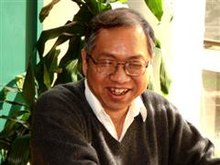Shing-Tung Yau
| Shing-Tung Yau | |
|---|---|
 |
|
| Born |
April 4, 1949 Shantou, Guangdong Province, China |
| Residence | U.S. |
| Nationality |
British Hong Kong (until 1990) American (since 1990) |
| Fields | Mathematics |
| Institutions |
Harvard University Stanford University Stony Brook University Institute for Advanced Study |
| Alma mater |
Chinese University of Hong Kong (B.A. 1969) University of California, Berkeley (Ph. D 1971) |
| Doctoral advisor | Shiing-Shen Chern |
| Doctoral students |
Richard Schoen (Stanford, 1977) Jun Li (Stanford, 1989) Huai-Dong Cao (Princeton, 1986) Gang Tian (Harvard, 1988) Lizhen Ji (Northeastern, 1991) Kefeng Liu (Harvard, 1993) Mu-Tao Wang (Harvard, 1998) Chiu-Chu Melissa Liu (Harvard, 2002) Mark Stern (Princeton, 1984) |
| Notable awards |
John J. Carty Award (1981) Veblen Prize (1981) Fields Medal (1982) Crafoord Prize (1994) National Medal of Science (1997) Wolf Prize (2010) |
Shing-Tung Yau (Chinese: 丘成桐; pinyin: Qiū Chéngtóng; Cantonese Yale: Yāu Sìngtùng; born April 4, 1949) is a Hong Kong and naturalised American mathematician. He was awarded the Fields Medal in 1982. He is currently the William Caspar Graustein Professor of Mathematics at Harvard.
Yau's work is mainly in differential geometry, especially in geometric analysis. His contributions have influenced both physics and mathematics, and he has been active at the interface between geometry and theoretical physics. His proof of the positive energy theorem in general relativity demonstrated—sixty years after its discovery—that Einstein's theory is consistent and stable. His proof of the Calabi conjecture allowed physicists to show, using Calabi–Yau compactification, that string theory is a viable candidate for a unified theory of nature. Calabi–Yau manifolds are part of the standard toolkit for string theorists today.
Yau was born in Shantou, Guangdong Province, China with Hakka ancestry in Jiaoling, Guangdong in a family of eight children. When he was only a few months old, his family emigrated to Hong Kong, where they lived in Yuen Long and Shatin.Yau's father, Chiou Chenying, was a philosophy professor.
...
Wikipedia
